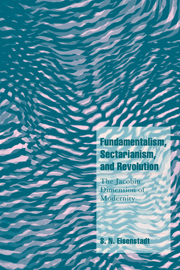Book contents
- Frontmatter
- Contents
- Preface
- 1 Heterodoxies, sectarianism, and utopianism in the constitution of proto-fundamentalist movements
- 2 The Great Revolutions and the transformation of sectarian utopianism in the cultural and political program of modernity
- 3 Fundamentalism as a modern Jacobin anti-modern utopia and heterodoxy – the totalistic reconstruction of tradition
- 4 Historical setting and variability of fundamentalist movements
- 5 Some considerations on modernity
- Notes
- Select bibliography
- Index
2 - The Great Revolutions and the transformation of sectarian utopianism in the cultural and political program of modernity
Published online by Cambridge University Press: 30 September 2009
- Frontmatter
- Contents
- Preface
- 1 Heterodoxies, sectarianism, and utopianism in the constitution of proto-fundamentalist movements
- 2 The Great Revolutions and the transformation of sectarian utopianism in the cultural and political program of modernity
- 3 Fundamentalism as a modern Jacobin anti-modern utopia and heterodoxy – the totalistic reconstruction of tradition
- 4 Historical setting and variability of fundamentalist movements
- 5 Some considerations on modernity
- Notes
- Select bibliography
- Index
Summary
The distinctive characteristics of the Great Revolutions – the modern transformation of sectarian utopianism
In the preceding discussion we have seen that while the kernels of proto-fundamentalist movements existed in all the Axial Civilizations, in some they developed more and had greater influence. Their influence became very important, possibly central, in the crystallization of modernity, and they have generated, in a highly transformed way, a central component of the cultural and political program of the discourse of modernity, as well as of different modern social and political movements, including that of the modern fundamentalist movements.
Modern fundamentalist movements, despite their seemingly traditional flavor and their affinity to proto-fundamentalist movements, can – perhaps paradoxically – best be understood against the background of the development of modernity and within the framework of this development. These movements and ideologies constitute one of the social movements in modern societies as movements of protest that developed with modernity. They constitute one possible development within, or component of, the cultural and political program and discourse of modernity, as it crystallized above all with the Enlightenment and with the Great Revolutions, as it expanded throughout the world and has continually developed with its different potentialities, contradictions, and antinomies.
By the Great Revolutions we mean, following general usage, the English Civil War and Great Rebellion; the first Great Revolutions – the American and French Revolutions; and the later ones – the Russian, Chinese and Vietnamese Revolutions. The Revolt of the Netherlands has been sometimes designated, and justly so in my mind, as the precursor of the first Great Revolutions.
- Type
- Chapter
- Information
- Fundamentalism, Sectarianism, and RevolutionThe Jacobin Dimension of Modernity, pp. 39 - 81Publisher: Cambridge University PressPrint publication year: 2000

